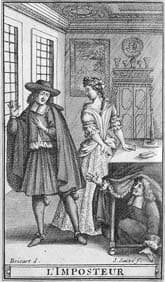Tartuffe
Critique • Quotes • Translations
 Frontispiece, 1682 edition
Frontispiece, 1682 editionAlso known as
Tartuffe, or The Imposter; Tartuffe, or The Hypocrite
First performance
1664
Literature form
Play
Genres
Comedy
Writing language
French
Author's country
France
Length
Five acts, approx. 22,000 words
Banned in Paris
It is hard to understand exactly why Tartuffe was once attacked by religious authorities. Molière's target is the title character who presents a pious outer appearance to hide his scheming for material gain. Shouldn't the church have opposed people adopting its practices as camouflage for doing evil? Molière never satirizes religion as such—only religious hypocrites.
Also it is a rather mild satire by today's standards. Frankly, I was disappointed when I started reading it. I remembered a rollicking good stage production from years previous, but on the printed page it seemed rather tame.
For one thing Tartuffe himself does not appear until the third act, an annoyance to the logical mind. But this turns out to be a dramatic masterstroke. We get to meet the family with which he is staying and we see in detail the disrupting effects this charlatan has on their relations before we meet him. The true central character is Orgon, the husband and father who becomes Tartuffe's greatest victim. Molière may be more interested in making a point about the susceptibility of people, just as in Othello Shakespeare was more interested in the demons that drove the victim Othello than in the evil nature of Iago.
When Tartuffe finally comes on the scene, our anticipation of this man's strange powers has built for almost half the play. Yet we are still unsure whether he is to be just an object of ridicule or something darker. Molière has let us speculate without any more evidence of his intentions than the members of the family have.
Unlikely saviour
In Tartuffe's attempted seduction of Orgon's wife and the sophistry he uses to justify it, we soon see he is to be both feared and laughed at. But when his scheming results in the family losing its home, we are taken to a more serious level of devilry. At this point the play reaches its apex as a tragedy.
When all appears lost, however, there occurs an artificial conclusion, an embarrassingly obvious deus ex machina in which the king, no less, acts as saviour and brings about a happy ending. This has got to be a sop to Molière's royal patron who was keeping the theatre company in business despite opposition from the Moral Majority of the day. For me, he almost blows the whole thing at this point.
To be fair though, I understand this resolution comes across much more vitally in French and in English translations that understand the interplay of satire and serious intent in Molière's dramatic poetry. Yes, the play was originally written in rhyming French verse, though many translations either drop the rhyming or drop the poetry all together. (See the comparison of Tartuffe translations for more on the different versions that are available
I can't blame Molière for a wimp-out ending though. He did what he could to kick against the hypocrites. And he gave us a great play in the process.
Read it by all means. But go see it on stage if it's ever playing near you.
— Eric
Critique • Quotes • Translations

